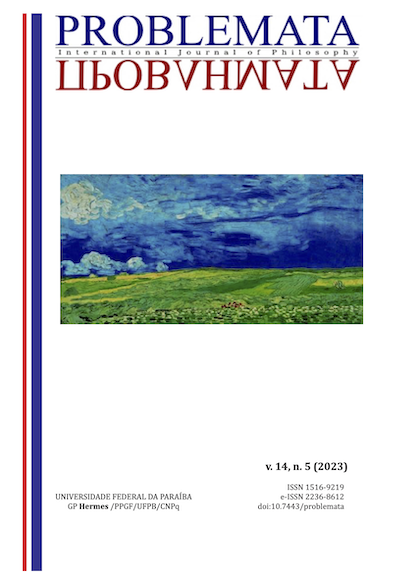REJECTING WAR:
NORBERTO BOBBIO AND THE CONSCIENTIOUS OBJECTION
DOI:
https://doi.org/10.7443/problemata.v14i5.67918Keywords:
Bobbio, war, Atomic Consciousness, Conscientious ObjectionAbstract
In this essay, we shall delve into the question of conscientious objection to war, as viewed through the lens of Bobbio's philosophical framework. The first section of the article is devoted to examining wars, wherein Bobbio provides a historical critique of the various reflections on the human toll exacted by these conflicts. Of particular emphasis is the escalating threat of thermonuclear warfare, capable of obliterating life as we know it. In the second section, we explore Bobbio's conceptualization of conscientious objection. Faced with the looming possibility of atomic warfare, he posits that it becomes incumbent upon all individuals to adopt the stance of conscientious objectors with regard to any form of war, including wars deemed as acts of legitimate defense. Subsequently, we shall engage in an analysis and critique of the arguments that have historically been employed to justify war. Throughout history, an array of arguments has been advanced in an attempt to legitimize the violence and its dehumanizing consequences, such as the notion of war as a necessary evil, the distinction between just and unjust wars, and the perception of war as a lesser evil and an inevitable phenomenon. The article concludes with critical considerations on Bobbio's conceptualization of conscientious objection, demonstrating that his idealistic viewpoint provides only a partial resolution to the intricate problem of war.
Downloads
References
ARENDT, Hannah. Origens do totalitarismo. Trad. Roberto Raposo. São Paulo: Companhia das Letras, 1989.
BRESOLIN, Keberson; SANCHES, Vitor Elias. Comunitarismo: uma abordagem teórica e um estudo de caso. Conjectura: Filos. Educ. v. 27, 2022. Caxias do Sul. e022035.
BOBBIO, Norberto. A paz: O conceito, o problema, o ideal. In: BOBBIO, Norberto; BOVERO, Michelangelo; VERSIANI, Daniela Beccaccia. Teoria geral da política: a filosofia política e as lições dos clássicos. Rio de Janeiro: Campus, 2000. p. 509-543.
BOBBIO, Norberto. Não Matar (1961). In. BOBBIO. Norberto. O terceiro ausente: ensaios e discursos sobre a paz e a guerra. Tradução Daniela Beccaccia Versiani; organizador Pietro Polito; prefácio à edição brasileira Celso Lafer. Barueri, SP, Manoele, 2009.
BOBBIO, Norberto. O problema da guerra e as vias de paz. Tradução Álvaro Lorencini. São Paulo. Editora UNESP, 2003.
BOBBIO, Norberto. Paz. In: BOBBIO, Norberto; MATTEUCCI, Niccola; PASQUINO, Gianfranco. Dicionário de política. Trad. Carmen C. Varrialle et al. 11. Ed. Brasília, DF: UnB, 1992. v. 2. p. 910-916.
CARINHENO, Gabrielle C. Norberto Bobbio: do Sistema Internacional à teoria da Guerra e da Paz. Aurora, Marília, v.12, p. 177-188, 2019. Edição Especial.
CARVALHO, Joaquim Francisco de. A gênese da bomba. estudos avançados 29 (84), 2015.
LOSANO, Mario G. Norberto Bobbio: uma biografia cultura. Traduzido por Erica Salatini, Gesualdo Maffia. São Paulo: Editora Unesp; Instituto Norberto Bobbio, 2022.
RAWLS, John. The law of peoples: with, The idea of public reason revisited. Cambridge: Harvard University Press, 2000
SAID, Edward. Orientalismo: o Oriente como invenção do Ocidente. Trad. Tomás Rosa Bueno. São Paulo: Companhia das Letras, 1990.
Downloads
Published
Issue
Section
License
Copyright (c) 2024 Keberson Bresolin, Edirlei Leandro Boldt Lourenço

This work is licensed under a Creative Commons Attribution 4.0 International License.
Authors who publish with this journal agree to the following terms:
- Authors retain copyright and grant the journal right of first publication with the work simultaneously licensed under a Creative Commons Attribution License that allows others to share the work with an acknowledgement of the work's authorship and initial publication in this journal.
- Authors are able to enter into separate, additional contractual arrangements for the non-exclusive distribution of the journal's published version of the work (e.g., post it to an institutional repository or publish it in a book), with an acknowledgement of its initial publication in this journal.
-
- Authors are permitted and encouraged to post their work online (e.g., in institutional repositories or on their website) prior to and during the submission process, as it can lead to productive exchanges, as well as earlier and greater citation of published work (See The Effect of Open Access).





